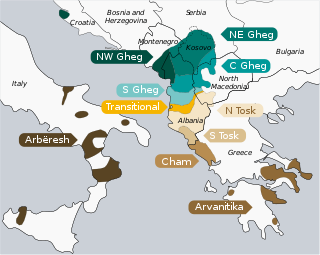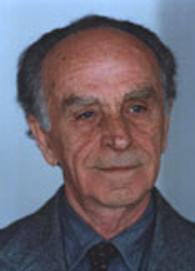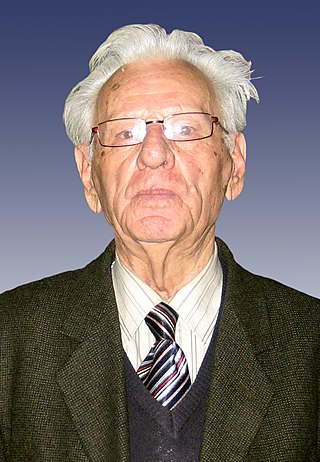Related Research Articles
Arvanitika, also known as Arvanitic, is the variety of Albanian traditionally spoken by the Arvanites, a population group in Greece. Arvanitika is today endangered, as its speakers have been shifting to the use of Greek and most younger members of the community no longer speak it.

Gjon Buzuku was an Albanian Catholic priest who wrote the first known printed book in Albanian. Gjon Buzuku according to the elders wrote the Missal in the village of Brisk Posht in the Shestan - Krajë region, close to Northern Albania, then Ottoman Empire. There are claims that he was the bishop of two dioceses in north Albania or that he was a monk.

Gheg is one of the two major varieties of Albanian, the other being Tosk. The geographic dividing line between the two varieties is the Shkumbin River, which winds its way through central Albania. Gheg is spoken in northern and central Albania, Kosovo, northwestern North Macedonia, southeastern Montenegro and southern Serbia by the Albanian dialectal subgroup known as Ghegs.
The Woordenboek der Nederlandsche Taal is a dictionary of the Dutch language. It contains between 350,000 and 400,000 entries describing Dutch words from 1500 to 1976. The paper edition consists of 43 volumes on 49,255 pages. It is believed to be the largest dictionary in the world in number of pages. The dictionary was nearly 150 years in the making from 1849; the first volume was published in 1864, and the final volume was presented to Albert II of Belgium and Beatrix of the Netherlands in 1998.
Arbëresh is the variety of Albanian spoken by the Arbëreshë people of Italy. It is derived from the Albanian Tosk spoken in Albania, in Epirus and is also spoken by the Arvanites, with endonym Arvanitika.

Albanian is an Indo-European language and an independent branch of that family of languages. It is spoken by the Albanians in the Balkans and by the Albanian diaspora, which is generally concentrated in the Americas, Europe and Oceania. With about 7.5 million speakers, it comprises an independent branch within the Indo-European languages and is not closely related to any other modern Indo-European language.

The Albanian language is composed of many dialects, divided into two major groups: Gheg and Tosk. The Shkumbin river is roughly the geographical dividing line, with Gheg spoken north of the Shkumbin and Tosk south of it.

Kostandin Nelko, known as Kostandin Kristoforidhi, was an Albanian translator and scholar. He is mostly known for having translated the New Testament into Albanian for the first time in the Gheg Albanian dialect in 1872. He also provided a translation in Tosk Albanian in 1879 thereby improving the 1823 tosk version of Vangjel Meksi. By providing translation in both dialects, he has the merit of founding the basis of the unification of both dialects into a national language.

Besim Bokshi was an Albanian poet, linguist and philologist. He served as the president of the Academy of Sciences and Arts of Kosovo during 2008-2011.

Zef Jubani or Giuseppe Jubany in Italian was an Albanian folklorist and activist of the Albanian National Awakening. He is known for the publication of a Collection of Albanian Folk Songs and Rhapsodies in the Gheg Albanian dialect. Jubani advocated the creation of a unique alphabet of the Albanian language. For his political activities, which often were anti-clericalist, Jubani was denounced to the Holy See by the Jesuit missionaries of Shkodër.

Mahir Domi (1915–2000) was an Albanian linguist, professor, and academic. He was one of the organizers and main participants of the Albanian Orthography Congress, and member of the follow up commission responsible for deploying the orthographic rules of the Standard Albanian language.

FC Feronikeli 74, commonly referred to as Feronikeli 74 and colloquially known as Feronikeli is a professional football club based in Drenas, Kosovo. The club play in the Football Superleague of Kosovo, which is the top tier of football in the country.

Haxhi Ymer Kashari known also as Ymer Mustafa Kashari was an Albanian bejtexhi of the 18th century.

Androkli Kostallari (1922–1992) was an Albanian linguist and scholar. He was one of the central figures of the Albanian language studies and founding member and director of the Albanian Institute of History and Linguistics, and later Institute of Linguistics and Literature. Kostallari is remembered for being one of the key expert contributor to the present Albanian language orthography established by the Congress of Orthography of 1972.

The Albanian Orthography Congress was a linguistics event held in Tirana, People's Republic of Albania in 1972. It established for the first time the unified orthographic rules of the Albanian language which are still in use today.

Idriz Ajeti was an Albanologist from Kosovo and one of the main researchers and authorities on the Albanian language studies of post World War II. He was involved for a long period in the academic life of the University of Pristina, and was a member of the Academy of Sciences and Arts of Kosovo, being its chairman for seven years.
The Albanian Literary Commission, also known as the Literary Commission of Shkodër, was a scholarly committee established in Shkodër, north Albania in 1916. It gathered major personalities of Albanian literature and writing of the time, and was formed with the aim of defining a fixed literary standard and orthographic rules for the Albanian language which were lacking at the time, in order to encourage the publication of schooltexts.

Shaban Demiraj (1920–2014) was an Albanian albanologist, linguist, professor at the University of Tirana from 1972–1990, and chairman of the Academy of Sciences of Albania during the period of 1993-1997.

The Arbanasi dialect is a dialect of Gheg Albanian that is spoken in long-standing diaspora communities of Albanians in Croatia. Its speakers originated from the region of Kraja, and moved to Croatia in the early 18th century.

The Lab Albanian dialect is a Tosk Albanian dialect associated with the wider definition of the ethnographic region of Labëria, spoken by Lab Albanians. Under this wider definition of Labëria, Lab Albanian stretches from Vlorë and Mallakastër south and east up to Gjirokastër, Lunxhëria and Sarandë. Notable aspects of Lab in Albanian and wider Balkan areal linguistics include its peculiar mix of conservative and innovative features, the lack of typical Albanian Balkanisms like the admirative, and the presence of features typical of Northern Gheg dialects despite it being a Southern dialect.